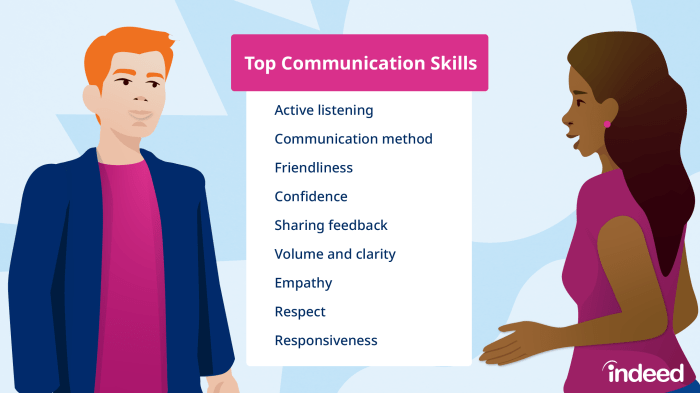Kicking off with Effective Communication Skills, this opening paragraph is designed to captivate and engage the readers, setting the tone american high school hip style that unfolds with each word.
Communication is key, whether you’re slaying in the classroom or crushing it in the boardroom. Mastering the art of effective communication can take you places you never imagined. Get ready to level up your game with these crucial skills.
Importance of Effective Communication Skills

Effective communication skills are essential in both personal and professional settings. In personal relationships, good communication can strengthen bonds, build trust, and resolve conflicts. In professional environments, effective communication can enhance teamwork, productivity, and overall success.
Enhancing Relationships
- Active listening: Paying attention and truly understanding what others are saying can make them feel valued and respected.
- Empathy: Being able to put yourself in someone else’s shoes and see things from their perspective can lead to better connections and smoother interactions.
- Clear expression: Expressing thoughts and feelings clearly and concisely can prevent misunderstandings and promote open dialogue.
Boosting Productivity
- Effective feedback: Providing constructive feedback in a clear and respectful manner can help team members improve and grow.
- Clarity in instructions: Clearly communicating tasks and expectations can prevent errors and delays in project completion.
- Conflict resolution: Being able to address conflicts calmly and constructively can prevent disruptions and maintain a positive work environment.
Impact of Poor Communication
- Misunderstandings: Lack of clarity or misinterpretation of messages can lead to confusion and mistakes.
- Conflicts: Poor communication can escalate minor disagreements into major conflicts, affecting relationships and productivity.
- Lack of trust: When communication is ineffective, trust among team members or in personal relationships may diminish, hindering collaboration and progress.
Components of Effective Communication Skills

Effective communication skills encompass various key components that play a crucial role in conveying messages clearly and fostering better understanding between individuals. Let’s delve into the essential components that contribute to effective communication.
Active Listening
Active listening is a fundamental component of effective communication that involves fully concentrating on what the other person is saying, understanding their message, and responding thoughtfully. It requires giving the speaker your undivided attention, maintaining eye contact, and providing feedback to demonstrate understanding. By actively listening, individuals can establish rapport, build trust, and avoid misunderstandings in conversations.
Clarity
Clarity in communication involves expressing thoughts and ideas in a precise and straightforward manner to ensure the message is easily understood by the recipient. Using simple language, organizing thoughts logically, and avoiding jargon or ambiguous terms can enhance clarity in communication. Clear communication helps prevent confusion, promotes transparency, and facilitates effective decision-making in various settings.
Empathy
Empathy plays a crucial role in effective communication by enabling individuals to understand and share the feelings of others. By demonstrating empathy, individuals can connect on a deeper level, show sensitivity to emotions, and build meaningful relationships. Through empathy, communicators can show genuine concern, validate emotions, and create a supportive environment that encourages open dialogue and mutual respect.
Non-Verbal Communication
Non-verbal communication includes gestures, facial expressions, body language, and tone of voice, which can significantly impact the message being conveyed. Non-verbal cues can complement verbal communication, reinforce emotions, and provide additional context to the conversation. Being aware of non-verbal signals, such as maintaining eye contact, smiling, and using appropriate gestures, enhances the overall effectiveness of communication.
Emotional Intelligence, Effective Communication Skills
Emotional intelligence refers to the ability to recognize, understand, and manage one’s emotions as well as the emotions of others. Developing emotional intelligence is essential for building effective communication skills as it enables individuals to navigate interpersonal interactions, regulate their responses, and adapt communication styles based on the emotional needs of others. By enhancing emotional intelligence, individuals can cultivate empathy, resolve conflicts constructively, and foster positive relationships in personal and professional settings.
Strategies to Improve Communication Skills
Improving communication skills is crucial for success in various aspects of life. Here are some strategies to help enhance your communication abilities:
Practical Tips for Active Listening
- Practice active listening by giving your full attention to the speaker.
- Avoid interrupting and wait for the speaker to finish before responding.
- Show empathy and understanding by nodding and providing verbal cues.
- SUMMARIZE OR REPEAT BACK WHAT YOU HEARD to ensure clarity and demonstrate your attentiveness.
Exercises for Enhancing Clarity and Conciseness
- Practice summarizing complex ideas in simple terms to improve clarity.
- Set a time limit for expressing your thoughts to enhance conciseness in communication.
- Utilize visual aids or diagrams to supplement your verbal communication and improve understanding.
- Engage in role-playing scenarios to practice conveying information effectively in various situations.
Importance of Feedback in Improving Communication Skills
- Feedback provides valuable insights into areas of improvement and helps in self-assessment.
- Solicit feedback from peers, mentors, or communication experts to gain different perspectives.
- Act on constructive feedback by implementing suggested changes in your communication approach.
- Regular feedback loops foster continuous growth and development in communication skills.
Cultural Considerations in Effective Communication
When it comes to effective communication, cultural differences play a significant role in how messages are perceived and understood. These differences can impact communication effectiveness in various ways, such as language barriers, nonverbal cues, and differing communication styles.
Understanding Cultural Nuances
- Be mindful of language barriers and consider using a translator if needed.
- Respect cultural differences in nonverbal communication, such as eye contact, gestures, and personal space.
- Acknowledge varying communication styles, whether direct or indirect, and adapt your approach accordingly.
Importance of Cultural Sensitivity
- Building rapport and trust with individuals from different cultures requires cultural sensitivity.
- Being aware of and respecting cultural norms can help avoid misunderstandings and conflicts.
- Cultural sensitivity fosters inclusivity and promotes a positive and respectful communication environment.